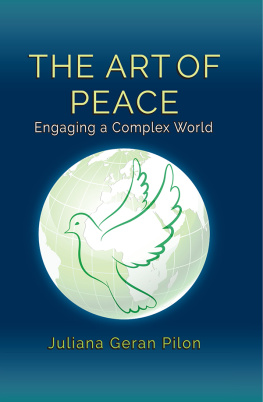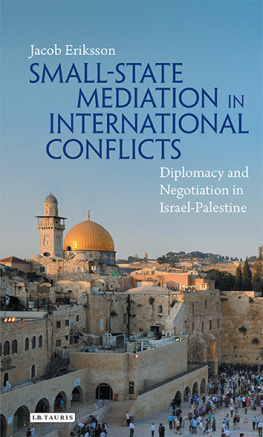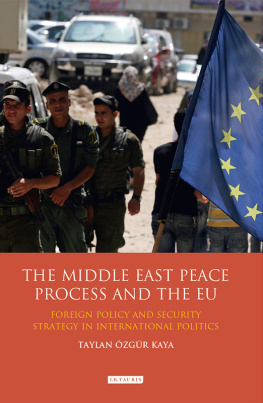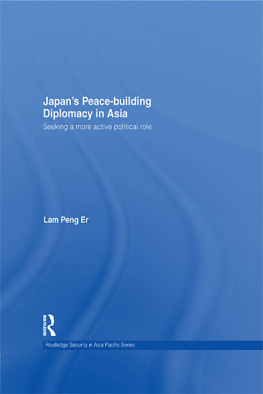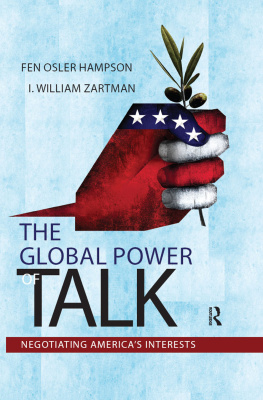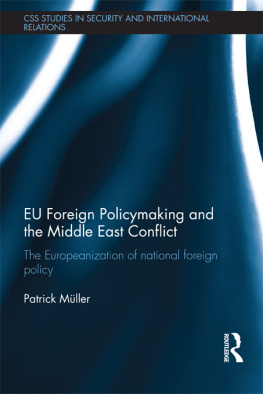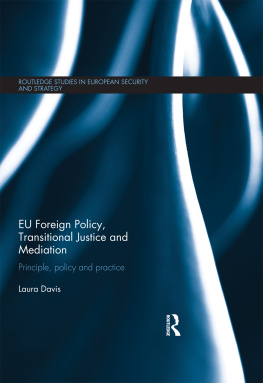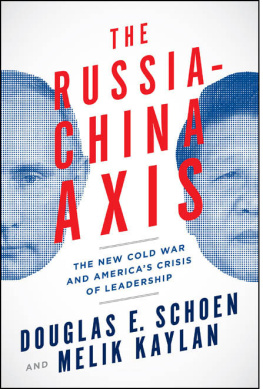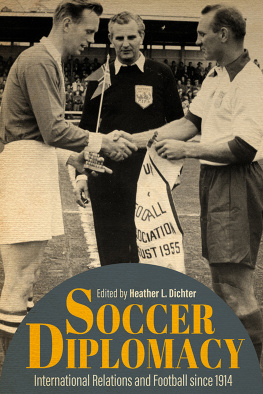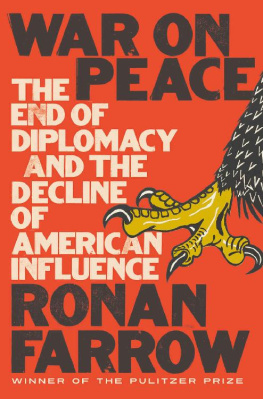CONTENTS
First published 2016 by Transaction Publishers
Published 2017 by Routledge
2 Park Square, Milton Park, Abingdon, Oxon OX14 4RN
711 Third Avenue, New York, NY 10017
Routledge is an imprint of the Taylor and Francis Group, an informa business
Copyright 2016 by Taylor & Francis.
All rights reserved. No part of this book may be reprinted or reproduced or utilised in any form or by any electronic, mechanical, or other means, now known or hereafter invented, including photocopying and recording, or in any information storage or retrieval system, without permission in writing from the publishers.
Notice:
Product or corporate names may be trademarks or registered trademarks, and are used only for identification and explanation without intent to infringe.
Library of Congress Catalog Number: 2016024677
Library of Congress Cataloging-in-Publication Data
Names: Pilon, Juliana Geran, author.
Title: The art of peace : engaging a complex world / Juliana Geran Pilon.
Description: New Brunswick (U.S.A.) : Transaction Publishers, [2016] | Includes bibliographical references and index.
Identifiers: LCCN 2016024677 (print) | LCCN 2016041616 (ebook) | ISBN 9781412864237 (hardcover) | ISBN 9781412864442 (pbk.) | ISBN 9781412863865 (eBook) | ISBN 9781412863865
Subjects: LCSH: United States--Foreign relations--Philosophy. | World politics--21st century.
Classification: LCC JZ1480 .P57 2016 (print) | LCC JZ1480 (ebook) | DDC 327.73--dc23
LC record available at https://lccn.loc.gov/2016024677
ISBN 13: 978-1-4128-6423-7 (hbk)
ISBN 13: 978-1-4128-6444-2 (pbk)
Contents
This book is dedicated to my beloved late parents, Charlotte and Peter Geran, with gratitude for finding the courage to wait with equanimity seventeen years till our family was allowed to leave Communist Romania and finally reach freedom in America.
Like it or not, today we are part of this larger world and must carry out our part. We cannot wait for problems to arrive here or it will be too late; rather we must remain strongly engaged in this complex world.
The international order built on the state system is not self-sustaining. It demands tending by an America that leads wisely, standing unapologetically for the freedoms each of us... has enjoyed.
[We must address] the need for America to adapt to changing circumstances, to come out now from its reactive crouch and to take a firm strategic stance in defense of our values.
U.S. Marine Corps General James N. Mattis (Ret.)
To believe that at any historical point men will rest content with a peace that deprives them of personal and political liberties is an illusion reserved for those who reap the advantages from a dichotomy in the world politic.
Irving Louis Horowitz
The Art of Peace is medicine for a sick world.
Morihei Ueshiba
Karl von Clausewitz occupies a place of honor among military strategists and practitioners of warfare. His treatise On War is a staple in the education of virtually all American officers. It is discussed, read, and studied (often in that order) at the intermediate and higher levels of professional military education. Debates over the nuances of coup doeil or center of gravity resound in college academic halls and the headquarters of military units at all echelons of command. Quite frankly, in military circles you cannot go wrong introducing a paper with a quote from Dead Karl, or cleverly inserting a term like schwerpunkt to sway opponents to your way of thinking. There is good reason for this, and in no way is it meant to detract from the great Prussian. The foundational tenets of Clausewitzian thought, that war is the extension of policy by other means, or that warfare itself is an illogical thing whose outcome rests on the relationship between the State, the military, and the people, are as close to timeless wisdom as exist in the literature.
Clausewitzs ideas hold considerable appeal to the Western mind and have had a huge impact on our way of war. His emphasis on focusing against an opponents source of strength, on the critical need to maintain popular support in war, even his prescriptions for victory where they can be found or extrapolated, align well with our desire for rationality in a fundamentally irrational endeavor. Taken in isolation, they provide much wanted guideposts to victory, even as we struggle against the fog and friction of warfare that the author himself warned us against.
In dominating the landscape of our thinking about war, Clausewitzian thought crowds out alternate approaches to both military strategy, and perhaps more importantly, to the way we as a nation conceptualize and employ the vast arsenal of tools at our disposal in the pursuit of national goals and objectives. We sometimes forget that Clausewitz the man is not wholly represented in his seminal work, or that he might have expanded upon the role of economics, intelligence and statecraft had he not died as a result of battlefield service at the age of 51. On these topics and others, On War is silent, while Clausewitz the man likely was not.
Dr. Juliana Pilon challenges us to address these biases in our thinking, breaking the conceptual chains that bind us to a rigid strategic approach that has not delivered lasting results. In this ambitious work, she reintroduces us to a thinker of equal renown, the inimitable Sun Tzu. Whether his writings on strategy are the work of a single author or the distillation of centuries of wisdom by many, they encourage us to think differently, to approach strategy and warfare from a different perch that is arguably higher in altitude and broader in vision than that offered in Clausewitzs sole unfinished work. The approach taken here is complementary, opting against the either this or that approach so prevalent in our rationalist approach to strategy making. Instead, it asks us to hold two countervailing positions simultaneously, to acknowledge that the complexity of the real world, whether in politics or at the end of a gun, can rarely be reduced to a cost-benefit equation.
At a practical level, this work begins to address the yawning gap so painfully exposed by the Soldiers of this generation. For almost 16 years, we have fought a series of campaigns against seemingly intractable enemies. To be sure, the wars in Afghanistan and Iraq delivered an almost unblemished record of success at the tactical level. Given a mission, we have proven time and again that we have the ability to take any hill or hold any piece of ground. Against enemies unconstrained by concerns over innocent life, we have demonstrated a near-surgical level of precision and reduced collateral damage to negligible levels. For all this success in the field, however, we have very little to show for our efforts.
Despite an immense expenditure, measured not only in dollars, but in American lives, we need turn no further than the evening news to see that there is no stable government in Iraq; no denial of safe havens in Afghanistan; and Islamic radicalism has spread across the continent, swallowing up competing groups as they pledge allegiance to the entity we know as the Islamic State. While we might debate whether or not this presents an existential threat to our nation, it is undeniable that our tactical military dominance has not produced lasting strategic results. This despite the best efforts of countless Americans, in uniform and out, totally committed to the task. The question is, why?
As a career Soldier of twenty-five years with combat deployments to Iraq, Afghanistan, and most recently commanding a brigade in Operation Inherent Resolve, hard experience offers insights but no answers. As a people, we dont seek to truly understand our enemy, or at times ourselves. Good intentions, whether in the form of liberating a village or building a million-dollar reconstruction project, run aground when they are uninformed by the constraints of local politics, unsustainable in a faltering economy, or cut short and abandoned because they dont immediately deliver results. We can and must do better.

